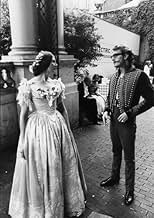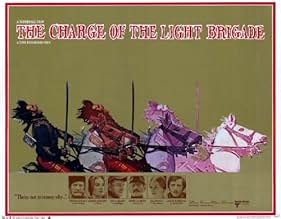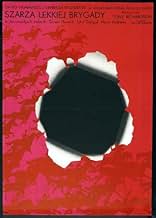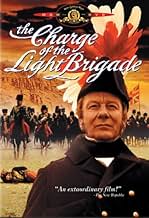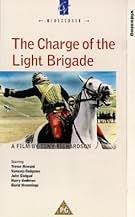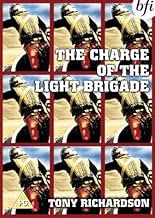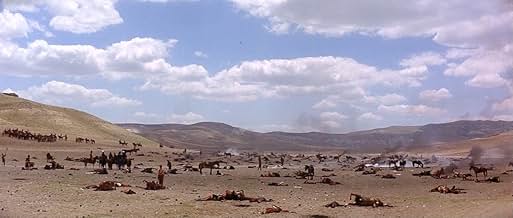IMDb रेटिंग
6.6/10
4.2 हज़ार
आपकी रेटिंग
अपनी भाषा में प्लॉट जोड़ेंIn 1854, during the Crimean War, poor planning leads to the British Light Brigade openly charging a Russian artillery position with tragic consequences.In 1854, during the Crimean War, poor planning leads to the British Light Brigade openly charging a Russian artillery position with tragic consequences.In 1854, during the Crimean War, poor planning leads to the British Light Brigade openly charging a Russian artillery position with tragic consequences.
- निर्देशक
- लेखक
- स्टार
- 7 BAFTA अवार्ड के लिए नामांकित
- 7 कुल नामांकन
John J. Carney
- Trooper Mitchell
- (as John Carney)
Howard Marion-Crawford
- Lt. Gen. Sir George Brown
- (as Howard Marion Crawford)
Christopher Cunningham
- Farrier
- (as Chris Cunningham)
फ़ीचर्ड समीक्षाएं
So much of the hard part of making a movie about the Crimean War and those who fought there they got right, it's a shame the film-makers couldn't nail the last 30%.
The reenactment of Victorian society is impeccable. In dress, manner, and speech. The battle scenes, too, are remarkably faithful to the original locations and deployments, given the obvious limitations in budget and pre-CGI effects.
The actors playing they major characters, Raglan (Gielgud), Lucan (Andrews), and Cardigan (Howard) all do an excellent job.
And I actually likes the Punch-style animated cut scenes. There was, after all, no way they could show a fleet of several hundred war ships sailing into the Black Sea. Best not try.
So, the problems:
The charge, a comparatively minor screw-up book-ended by major Allied victories at the battles of the Alma and at Inkerman, was the result of a combination of small oversights, fog of war, and bad luck. So while there is a story to tell here there are no clear cut heroes except for the soldiers themselves, and certainly no villains.
So, to make a movie, you can choose either to change history and make larger than life, cartoon characters based on the exaggerated media reports of the day, and the 1950's book which was something of a anti- Cardigan hit piece, ... or you can play it straight, say "this is what it was like" and try to relate the experience, the esprit-de-corps, and yes, the interpersonal tensions, as raw as possible from the top of the command chain to the bottom.
This movie tries to have it both ways, it's cartoony but only for the intention of scoring cheap anti-war satire (all generals are imbeciles!), rather than to actually make the movie more enjoyable or engaging. When the war gets close and personal, it reverts back to just showing events... realistically, but with little or no emotional investment. The mechanics of the charge itself are done well, though.
And then the movie just ends, way too suddenly.
Now maybe, just maybe, Captain Nolan was supposed to be the "hero", the romantic sub-plot (distracting and totally irrelevant to the movie) seems to suggest it, but instead he just comes across as an impatient, vain, inexperienced know-it-all, a thin and unflattering caricature.
So, worth watching, but in better hands it could have been so much more.
The reenactment of Victorian society is impeccable. In dress, manner, and speech. The battle scenes, too, are remarkably faithful to the original locations and deployments, given the obvious limitations in budget and pre-CGI effects.
The actors playing they major characters, Raglan (Gielgud), Lucan (Andrews), and Cardigan (Howard) all do an excellent job.
And I actually likes the Punch-style animated cut scenes. There was, after all, no way they could show a fleet of several hundred war ships sailing into the Black Sea. Best not try.
So, the problems:
The charge, a comparatively minor screw-up book-ended by major Allied victories at the battles of the Alma and at Inkerman, was the result of a combination of small oversights, fog of war, and bad luck. So while there is a story to tell here there are no clear cut heroes except for the soldiers themselves, and certainly no villains.
So, to make a movie, you can choose either to change history and make larger than life, cartoon characters based on the exaggerated media reports of the day, and the 1950's book which was something of a anti- Cardigan hit piece, ... or you can play it straight, say "this is what it was like" and try to relate the experience, the esprit-de-corps, and yes, the interpersonal tensions, as raw as possible from the top of the command chain to the bottom.
This movie tries to have it both ways, it's cartoony but only for the intention of scoring cheap anti-war satire (all generals are imbeciles!), rather than to actually make the movie more enjoyable or engaging. When the war gets close and personal, it reverts back to just showing events... realistically, but with little or no emotional investment. The mechanics of the charge itself are done well, though.
And then the movie just ends, way too suddenly.
Now maybe, just maybe, Captain Nolan was supposed to be the "hero", the romantic sub-plot (distracting and totally irrelevant to the movie) seems to suggest it, but instead he just comes across as an impatient, vain, inexperienced know-it-all, a thin and unflattering caricature.
So, worth watching, but in better hands it could have been so much more.
Tony Richards was an ideas man, in some loose sense a lot like his contemporary 60s director Richard Lester. The two of them were mavericks, often eschewing traditional and reliable modes of film making in preference to trying out unchartered techniques - born out of nothing else but their own imaginations. Lester did this to achieve an original knockabout and racy product, and Richardson did it to achieve a more stark and poignant effect for the supposed thinking-man's 'swinging' audience of the time. However, not all these ideas worked well in practice. The Charge of the Light Brigade is an example of one of these misfires.
The film is a classic piece of late sixties film making; both in the bizarre arty techniques used, and in the bold anti-war message. The idea of the film is to shamelessly point out the blind arrogance that lies behind the decisions made by those at the top to go to war. Arrogance, the film conveys very clearly, which is based purely upon blissful ignorance. The audience is invited to feast upon the bumbling Lord Raglan (John Gielgud), who nonchalantly sits at his desk in the war office and calls the shots based only on his devotion to England's great past, rather than on any rational thought. We meet, and are disgusted with, Lord Cardigan (Trevor Howard) whose arrogance is the driving force behind all he does. He believes that he is always right no matter what, simply because as the captain he is in charge. He's more concerned with what his men drink out of in the mess, and punishing them for their wrongdoings, rather than on running a well oiled military machine. To him, he is the most important part of that machine.
In contrast to these men is Nolan (David Hemmings), an idealistic military man with 'principles'. He believes in good sound leadership and decision making, and as such is constantly at odds with the stuffy and arrogant attitudes of his superiors - they are always right and he should speak when he's spoken to, even if he has a valid idea. Note Lord Raglan's line: "It is a sad day for Britain when her officers know too much what they are doing." Nolan is the man trying to fight vainly against the ignorance-entrenched system.
All this happens to the backdrop of Britain choosing to join in on a foreign war - to save Turkey from Russia. It is a war Engalnd should not have been involved in, but the arrogant big wigs made the decision to go. In true 60s anti-war style, the arrogance of those in charge of the war machine brings about its own destruction. Nolan was right, Raglan and Cardigan were wrong and didn't care to accept that, the light brigade was lost, and a blaming game ensues. While riding over the corpse of Nolan, Cardigan threw the blame on Lord Lucan, Lucan in turn threw the hot potato to Raglan, and Raglan laid the blame on the poor innocent man who wrote the order that Raglan himself dictated to him. As such, the pointlessness of war, and the destructive capability of blind ignorance based on an arrogance derived solely from power was brought forth clearly.
However, the directing techniques to bring this powerfully stark message to life were not up to the task. Too many dreamy sequences were used which just distract the audience; the script was at times just downright boring; and too often, in the director's eagerness to achieve an arty effect, the powerful meaning of an entire scene was lost. It is one of those films that you really have to pay attention to and concentrate on the whole way through; and this isn't just because The Charge of the Light Brigade is a thinking-man's film, it is because the meaning of many of the scenes is hidden, shrouded behind quite a bit of self-indulgent (or imaginative) imagery. Too often Tony Richardson's 'ideas' simply confuse the audience.
However, as I have said, the film does have a point to make, and this point is evident to all at the end of the film, no matter how many scenes were a little too cryptic. Therefore the film was successful. In addition, there were many great scenes, such as the one where Lord Raglan rides straight through a peaceful anti-war demonstration on his horse, destroying banners and calling the demonstrators traitors. The scene where the British soldiers were seen dying of heatstroke on the plains before even reaching Sebastopol was done well, especially when the scene cut straight to London, where it was reported in the newspapers, untruthfully, that Sebastopol had already fallen. This scene went straight for the jugular in its anti-propaganda and anti-government stance. And of course there is the brilliant period animation showing England as the saviour of the world, and the encourager of world industry and prosperity. These animations contrasted beautifully with the scenes of petty bickering and war-mongering in Lord Raglan's corridors of power.
A great cast and a stark and powerful idea make The Charge of the Light Brigade an interesting film, and at least a good production. The film still rings through in todays international and political climate, and especially shows how not so far we have come, and how many mistakes we have not learned from since the 1960s, and even since the 1850s. However, a sharper script and clearer direction would have helped immeasurably, and would have probably transformed this film into a classic powerhouse, rather than the languishing near miss it is. 6/10
The film is a classic piece of late sixties film making; both in the bizarre arty techniques used, and in the bold anti-war message. The idea of the film is to shamelessly point out the blind arrogance that lies behind the decisions made by those at the top to go to war. Arrogance, the film conveys very clearly, which is based purely upon blissful ignorance. The audience is invited to feast upon the bumbling Lord Raglan (John Gielgud), who nonchalantly sits at his desk in the war office and calls the shots based only on his devotion to England's great past, rather than on any rational thought. We meet, and are disgusted with, Lord Cardigan (Trevor Howard) whose arrogance is the driving force behind all he does. He believes that he is always right no matter what, simply because as the captain he is in charge. He's more concerned with what his men drink out of in the mess, and punishing them for their wrongdoings, rather than on running a well oiled military machine. To him, he is the most important part of that machine.
In contrast to these men is Nolan (David Hemmings), an idealistic military man with 'principles'. He believes in good sound leadership and decision making, and as such is constantly at odds with the stuffy and arrogant attitudes of his superiors - they are always right and he should speak when he's spoken to, even if he has a valid idea. Note Lord Raglan's line: "It is a sad day for Britain when her officers know too much what they are doing." Nolan is the man trying to fight vainly against the ignorance-entrenched system.
All this happens to the backdrop of Britain choosing to join in on a foreign war - to save Turkey from Russia. It is a war Engalnd should not have been involved in, but the arrogant big wigs made the decision to go. In true 60s anti-war style, the arrogance of those in charge of the war machine brings about its own destruction. Nolan was right, Raglan and Cardigan were wrong and didn't care to accept that, the light brigade was lost, and a blaming game ensues. While riding over the corpse of Nolan, Cardigan threw the blame on Lord Lucan, Lucan in turn threw the hot potato to Raglan, and Raglan laid the blame on the poor innocent man who wrote the order that Raglan himself dictated to him. As such, the pointlessness of war, and the destructive capability of blind ignorance based on an arrogance derived solely from power was brought forth clearly.
However, the directing techniques to bring this powerfully stark message to life were not up to the task. Too many dreamy sequences were used which just distract the audience; the script was at times just downright boring; and too often, in the director's eagerness to achieve an arty effect, the powerful meaning of an entire scene was lost. It is one of those films that you really have to pay attention to and concentrate on the whole way through; and this isn't just because The Charge of the Light Brigade is a thinking-man's film, it is because the meaning of many of the scenes is hidden, shrouded behind quite a bit of self-indulgent (or imaginative) imagery. Too often Tony Richardson's 'ideas' simply confuse the audience.
However, as I have said, the film does have a point to make, and this point is evident to all at the end of the film, no matter how many scenes were a little too cryptic. Therefore the film was successful. In addition, there were many great scenes, such as the one where Lord Raglan rides straight through a peaceful anti-war demonstration on his horse, destroying banners and calling the demonstrators traitors. The scene where the British soldiers were seen dying of heatstroke on the plains before even reaching Sebastopol was done well, especially when the scene cut straight to London, where it was reported in the newspapers, untruthfully, that Sebastopol had already fallen. This scene went straight for the jugular in its anti-propaganda and anti-government stance. And of course there is the brilliant period animation showing England as the saviour of the world, and the encourager of world industry and prosperity. These animations contrasted beautifully with the scenes of petty bickering and war-mongering in Lord Raglan's corridors of power.
A great cast and a stark and powerful idea make The Charge of the Light Brigade an interesting film, and at least a good production. The film still rings through in todays international and political climate, and especially shows how not so far we have come, and how many mistakes we have not learned from since the 1960s, and even since the 1850s. However, a sharper script and clearer direction would have helped immeasurably, and would have probably transformed this film into a classic powerhouse, rather than the languishing near miss it is. 6/10
I do find it fascinating to come across obscure, almost forgotten films like this with familiar faces and famous actors in it. It was made ca. 1968, and in the true spirit of '68, it is strongly anti-war, anti-military, and anti-establishment, even though it is set in the Victorian era, the height of the Romantic age, when Military valor was largely celebrated. Military life is here portrayed in terms of ranks of men being bullied and brutalized by each successive rank above them, with the biggest, meanest and stupidest ones at the top.
I found it quite interesting to see the famous charge, celebrated in the romantic verses of Tennyson, portrayed in such a matter-of-fact manner as a series of tactical blunders due to bad communication and incompatible personalities among the commanders. These events were supposedly well-researched, and though I am not informed on the subject, I found this version of events very credible. Even with the high level of weapons and communications technology we have today, this sort of thing still happens. It must have been very common in centuries past.
To me, the dialog of this film and its delivery by the actors is its most remarkable feature. Seeing films that depict distant eras, I've often thought that these eras must have not just looked different from what we are used to, but sounded very different as well. If we were suddenly dropped into Victorian England, we wouldn't always understand what was being said or inferred to us. Words, phrases, gestures, facial expressions or body language that would have obvious meaning in that time and place would be strange to us. The language and syntax would, of course, be different, but so would the rhythm, pace, expressive color and accenting of the way people spoke. `Charge of the Light Brigade' does a remarkable job of not just looking, but sounding like a distant place and time. For a viewer who is not educated in antique British expressions and military jargon, as I am not, it makes watching this film a bit challenging, but it's like spending 130 minutes in the Victorian age as a so-called `fly-on-the-wall,' as the British put it. There was more than one line spoken after which I thought `say what?' But that's OK. It doesn't kill you, just encourages you to think a bit. This aspect of the film looks to be well-researched as well, a superb example of a somewhat talky script in which great care is taken with the language and its use by the actors. The script doesn't serve the purpose of an exposition device for the dumbest members of the audience, a very common vice in films, particularly big-money films engineered to alienate as few people as possible. It's an integral part of a design to recreate an unfamiliar time and place, and as such, a bit uncompromising.
I found it quite interesting to see the famous charge, celebrated in the romantic verses of Tennyson, portrayed in such a matter-of-fact manner as a series of tactical blunders due to bad communication and incompatible personalities among the commanders. These events were supposedly well-researched, and though I am not informed on the subject, I found this version of events very credible. Even with the high level of weapons and communications technology we have today, this sort of thing still happens. It must have been very common in centuries past.
To me, the dialog of this film and its delivery by the actors is its most remarkable feature. Seeing films that depict distant eras, I've often thought that these eras must have not just looked different from what we are used to, but sounded very different as well. If we were suddenly dropped into Victorian England, we wouldn't always understand what was being said or inferred to us. Words, phrases, gestures, facial expressions or body language that would have obvious meaning in that time and place would be strange to us. The language and syntax would, of course, be different, but so would the rhythm, pace, expressive color and accenting of the way people spoke. `Charge of the Light Brigade' does a remarkable job of not just looking, but sounding like a distant place and time. For a viewer who is not educated in antique British expressions and military jargon, as I am not, it makes watching this film a bit challenging, but it's like spending 130 minutes in the Victorian age as a so-called `fly-on-the-wall,' as the British put it. There was more than one line spoken after which I thought `say what?' But that's OK. It doesn't kill you, just encourages you to think a bit. This aspect of the film looks to be well-researched as well, a superb example of a somewhat talky script in which great care is taken with the language and its use by the actors. The script doesn't serve the purpose of an exposition device for the dumbest members of the audience, a very common vice in films, particularly big-money films engineered to alienate as few people as possible. It's an integral part of a design to recreate an unfamiliar time and place, and as such, a bit uncompromising.
Let's make it very clear from the outset, this version of The Charge of The Light Brigade is in no way a remake of the Errol Flynn film that Warner Brothers did in 1936. This is a factual account about how several hundred of the best of that generation in the United Kingdom met their deaths in the Crimea.
Great Britain from the end of the Napoleonic Wars until the beginning of World War I was only involved in two formally declared conflicts. Although many British folks will cite various colonial enterprises, the only two major wars the British were involved in were the Crimean War and the Boer War. And it was only the Crimean War which involved them with and against other European powers, in this case Russia.
It all was about propping up the Ottoman Empire and keeping the Russians from getting a hold of Istanbul and an outlet to the Mediterranean Sea for their fleet. The problem was all the powers were woefully unprepared for such a war, British included.
The Charge of the Light Brigade as no other film explores the incredible ineptitude of the British Army at that time. Today it beggars the imagination that field grade officers simply purchased their commissions. It's true though, it's the reason why Lord Raglan, Lord Cardigan, and Lord Lucan a group of Colonel Blimps if there ever were, got in charge of things.
It's how it was done, the high army positions were reserved for their aristocracy. The Duke of Wellington had died in 1852, three years before the Crimean War and the charge. He also purchased his commission back in the day. It was just dumb luck that he happened to be a military genius. Lord Raglan who is played by John Gielgud was an able staff officer for Wellington, but as a strategist was hopelessly out of his depth.
Howewver the main two blunderers were a pair of quarreling in-laws, Lord Cardigan and Lord Lucan played by Trevor Howard and Harry Andrews. They would rather have sent their armies against each other than the Russians.
A lot of the best of that generation died charging the heights of Balaclava that day to get to Sevastapol because of these two mutts. In any kind of system based on merit these two would never have gotten to be sergeants let alone generals.
The Crimean War which basically ended as a stalemate because the Russians were as inept as the British led eventually to reform of the army. That reform came in the first ministry of William Gladstone (1868-1874)and his very able Secretary for War Lord Edward Cardwell who finally got Parliament to abolish purchase commissions and promotions were based on merit after that. Good thing too, because it staggers the imagination to think of the British Army going into World Wars I and II and the Boer War under the old system.
The charge at Balaclava gained its enduring legend through the popular poem of Alfred Lord Tennyson who was smart enough to romanticize the Noble Six Hundred instead of their inept leadership The movie that Errol Flynn and Olivia DeHavilland starred in back in 1936 was a romantic story inspired by that poem.
What Tony Richardson and the cast he directed in 1968 bring you the real story of the charge. It's a graphically accurate account and military historians should love this film.
Great Britain from the end of the Napoleonic Wars until the beginning of World War I was only involved in two formally declared conflicts. Although many British folks will cite various colonial enterprises, the only two major wars the British were involved in were the Crimean War and the Boer War. And it was only the Crimean War which involved them with and against other European powers, in this case Russia.
It all was about propping up the Ottoman Empire and keeping the Russians from getting a hold of Istanbul and an outlet to the Mediterranean Sea for their fleet. The problem was all the powers were woefully unprepared for such a war, British included.
The Charge of the Light Brigade as no other film explores the incredible ineptitude of the British Army at that time. Today it beggars the imagination that field grade officers simply purchased their commissions. It's true though, it's the reason why Lord Raglan, Lord Cardigan, and Lord Lucan a group of Colonel Blimps if there ever were, got in charge of things.
It's how it was done, the high army positions were reserved for their aristocracy. The Duke of Wellington had died in 1852, three years before the Crimean War and the charge. He also purchased his commission back in the day. It was just dumb luck that he happened to be a military genius. Lord Raglan who is played by John Gielgud was an able staff officer for Wellington, but as a strategist was hopelessly out of his depth.
Howewver the main two blunderers were a pair of quarreling in-laws, Lord Cardigan and Lord Lucan played by Trevor Howard and Harry Andrews. They would rather have sent their armies against each other than the Russians.
A lot of the best of that generation died charging the heights of Balaclava that day to get to Sevastapol because of these two mutts. In any kind of system based on merit these two would never have gotten to be sergeants let alone generals.
The Crimean War which basically ended as a stalemate because the Russians were as inept as the British led eventually to reform of the army. That reform came in the first ministry of William Gladstone (1868-1874)and his very able Secretary for War Lord Edward Cardwell who finally got Parliament to abolish purchase commissions and promotions were based on merit after that. Good thing too, because it staggers the imagination to think of the British Army going into World Wars I and II and the Boer War under the old system.
The charge at Balaclava gained its enduring legend through the popular poem of Alfred Lord Tennyson who was smart enough to romanticize the Noble Six Hundred instead of their inept leadership The movie that Errol Flynn and Olivia DeHavilland starred in back in 1936 was a romantic story inspired by that poem.
What Tony Richardson and the cast he directed in 1968 bring you the real story of the charge. It's a graphically accurate account and military historians should love this film.
This movie was made in 1968 but I never got the impression from watching it that it was anti war. The movie was made entirely with British actors and a British director and the Brits never had an antiwar movement (because their government gave up its militarism after Suez in 1955). The movie depicts the British army as it existed in 1850. This was a period when one gained advancement in the army by money or title. It was a largely decadent and unprofessional army and the movie I think characterizes it rather well. In fact, Nolan wrote a book complaining about the need to professionalize the army but it took the near disastrous Crimean War to affect any serious changes (it too the British Navy another generation or more to make similar changes). At the time, there was a debate about the effectiveness of cavalry with some believing that no defensive position could withstand the full force of a disciplined cavalry charge--a left over from the Napoleonic Wars--while others thought a charge into artillery was near suicidal. Nolan's roll in the battle remains controversial and whether he delivered inaccurate verbal orders to Acrdigan to charge to prove the effectiveness of cavalry even against artillery or warn the brigade away has not been established because Nolan was killed.
As for the Crimean War, it also depicts the drum beat to war accurately and the implication that most of the dying was done by commoners and much of the death was caused by disease. It was an ugly war. What isn't shown is that the condition of the Russian army was far worse. The poor Russian peasant soldiers were sent to fight with smoothbore Napeolonic Era muskets with an effective range of perhaps 100 meters while the British and the French was new rifled muskets with a range of over 300 meters. In some battles very small forces of British held off huge numbers of Russians killing hundreds.
The Battle of Balaclave is generally depicted accurately. It was a calamity of errors. Capt Nolan actually lost his head during the charge and witnesses indicate that his horse continued running with corpse in the saddle for some distance before the body collapsed. The charge was initiated by the heavy Brigade led by Lord Lucan. There was a rivalry between Lucan and Lord Cardigan (brothers in law) and both brigades initially made the charge but the Heavies did not enter the Valley of Death. The Light Brigade continued into the Valley and were decimated but not wiped out. In fact they were supported by the French cavalry the Chasseurs d'Afrique and the Russian positions were in fact overrun. I think the charge as depicted in this movie is one of the most exciting I have ever seen captured in the cinema.
The so called Valley of Death has changed considerably since the 1850s. By 1994, it was entirely planted in vineyards and the only way to gain some sense of the battle is to find the famous Tractir Bridge over the Tchernaya River and follow the lines of hills. As for the town of Balaclava...I have a photograph of the town in 1854 with the British fleet anchored in the harbor. I took a photograph of this village in 1994 from just about the same angle as the 1854 image and then compared the two. The place is completely unchanged with even the stone buildings remaining. Of course, the village today is the base of the Ukranian Black Sea fleet and there is a not so secret submarine base cared into the limestone cliffs inside the harbor.
We may think that the Crimean War is ancient history but the people of Crimea do not. They have sort of a living museum called the Panaorma. This is a museum devoted to the siege of Sevastopol. There is a circular path and the visitor is engulfed by the on going battles on both sides of the path. One may wander the hills above Sevastopol and many of the rifle pits and trenches from the war remain (they were reused by the Russians during the unsuccessful defense of the city in 1942). It is a wonderful museum and it exemplifies the Russian attitude that history is alive and they don't forget their past.
This is a historically accurate movie. It moves a little slow at times and it has some amusing cartoonish graphics (almost reminiscent of Monty Python graphics). All the major players obviously have a great deal of fun with their rolls.
Anecdotes: Tony Richardson's two children, Nastasha and Joely are in the film as well is his sister in law Vanessa Redgrave. I think I have these relationships correct. Anyway, they are all related.
As for the Crimean War, it also depicts the drum beat to war accurately and the implication that most of the dying was done by commoners and much of the death was caused by disease. It was an ugly war. What isn't shown is that the condition of the Russian army was far worse. The poor Russian peasant soldiers were sent to fight with smoothbore Napeolonic Era muskets with an effective range of perhaps 100 meters while the British and the French was new rifled muskets with a range of over 300 meters. In some battles very small forces of British held off huge numbers of Russians killing hundreds.
The Battle of Balaclave is generally depicted accurately. It was a calamity of errors. Capt Nolan actually lost his head during the charge and witnesses indicate that his horse continued running with corpse in the saddle for some distance before the body collapsed. The charge was initiated by the heavy Brigade led by Lord Lucan. There was a rivalry between Lucan and Lord Cardigan (brothers in law) and both brigades initially made the charge but the Heavies did not enter the Valley of Death. The Light Brigade continued into the Valley and were decimated but not wiped out. In fact they were supported by the French cavalry the Chasseurs d'Afrique and the Russian positions were in fact overrun. I think the charge as depicted in this movie is one of the most exciting I have ever seen captured in the cinema.
The so called Valley of Death has changed considerably since the 1850s. By 1994, it was entirely planted in vineyards and the only way to gain some sense of the battle is to find the famous Tractir Bridge over the Tchernaya River and follow the lines of hills. As for the town of Balaclava...I have a photograph of the town in 1854 with the British fleet anchored in the harbor. I took a photograph of this village in 1994 from just about the same angle as the 1854 image and then compared the two. The place is completely unchanged with even the stone buildings remaining. Of course, the village today is the base of the Ukranian Black Sea fleet and there is a not so secret submarine base cared into the limestone cliffs inside the harbor.
We may think that the Crimean War is ancient history but the people of Crimea do not. They have sort of a living museum called the Panaorma. This is a museum devoted to the siege of Sevastopol. There is a circular path and the visitor is engulfed by the on going battles on both sides of the path. One may wander the hills above Sevastopol and many of the rifle pits and trenches from the war remain (they were reused by the Russians during the unsuccessful defense of the city in 1942). It is a wonderful museum and it exemplifies the Russian attitude that history is alive and they don't forget their past.
This is a historically accurate movie. It moves a little slow at times and it has some amusing cartoonish graphics (almost reminiscent of Monty Python graphics). All the major players obviously have a great deal of fun with their rolls.
Anecdotes: Tony Richardson's two children, Nastasha and Joely are in the film as well is his sister in law Vanessa Redgrave. I think I have these relationships correct. Anyway, they are all related.
क्या आपको पता है
- ट्रिवियाFilming was immensely problematic. Director Tony Richardson fired a stunt coordinator whose manic swordplay killed several horses. An earthquake destroyed the hotel used by the production. David Hemmings was extremely temperamental on-set. The crew and extras, many of whom were Turkish soldiers, fought verbally and physically with local villagers who resented their incursion into the area. Richardson's strange mixture of perfectionism and historical flippancy grated on both his crew and advisers. While filming the final battle, the soldiers were called away for a NATO war exercise, forcing Richardson to shoot the scene with only a few dozen stuntmen.
- गूफ़The character called Featherstonehaugh (played by Corin Redgrave) has his name pronounced more or less as it is written, with four syllables. An upper-class Englishman of the mid-19th century (or, indeed, today) would pronounce it "Fanshawe".
- भाव
Lord Raglan: It will be a sad day for England when her armies are officered by men who know too well what they are doing - it smacks of murder.
- क्रेज़ी क्रेडिटIn the animation over the opening credits, the English lion roars just as "A Woodfall Film" appears onscreen (mimicking Leo the Lion at the start of Metro-Goldwyn-Mayer movies).
- इसके अलावा अन्य वर्जनAlthough the cinema version was complete the 1993 UK video release was cut by 7 secs to edit footage of horse-falls. The 2008 Optimum DVD has the cuts length extended to 14 secs and features the 6 minutes shorter print as mentioned below.
- साउंडट्रैकThe Girl I Left Behind Me
(uncredited)
Traditional
Arranged by Trevor L. Sharpe
Heard before the Battle of the Alma
टॉप पसंद
रेटिंग देने के लिए साइन-इन करें और वैयक्तिकृत सुझावों के लिए वॉचलिस्ट करें
- How long is The Charge of the Light Brigade?Alexa द्वारा संचालित
विवरण
- रिलीज़ की तारीख़
- कंट्री ऑफ़ ओरिजिन
- भाषाएं
- इस रूप में भी जाना जाता है
- La carga de la brigada ligera
- फ़िल्माने की जगहें
- Pecenek, तुर्की(charge in the Valley of Death)
- उत्पादन कंपनी
- IMDbPro पर और कंपनी क्रेडिट देखें
बॉक्स ऑफ़िस
- बजट
- $80,00,000(अनुमानित)
- चलने की अवधि2 घंटे 19 मिनट
- रंग
- ध्वनि मिश्रण
- पक्ष अनुपात
- 2.35 : 1
इस पेज में योगदान दें
किसी बदलाव का सुझाव दें या अनुपलब्ध कॉन्टेंट जोड़ें

टॉप गैप
By what name was The Charge of the Light Brigade (1968) officially released in India in English?
जवाब

